- Home
- Peter Grainger
Lane: A Case For Willows And Lane Page 7
Lane: A Case For Willows And Lane Read online
Page 7
Lane was keeping up the speed, cutting across the inside of the right-hand bends, using the gearbox as it had never been used before. If we meet another vehicle, Emily was thinking - and then it actually happened. As they were coming out of a bend, there was a white van, what else, apparently in the centre of the road, no more than twenty yards ahead of them. In the split second window open to her, Lane had braked and taken two wheels of the Skoda onto the verge, itself little more than a yard wide. There were thumps and bumps but somehow the van got by them, or they got by the van.
Lane shouted ‘Roadhog!’ and laughed, picking up speed again.
Emily Willows stole a glance and thought to herself that the young woman was a little unhinged. And she thought too that this was all her own fault. Emily believed in destiny or fate or karma, call it what you will. She should never have told Robert this morning that she was bored.
‘Let them know we’re taking a detour, will you? And ask them if they’d like to join us at some point.’
Emily pressed buttons and swiped things on the iPhone but there was no response – it remained a beautifully smooth piece of black glass. Lane reached across, took it and drove at the same speed one-handed, eventually performing some sort of manoeuvre that involved pressing two buttons simultaneously with the thumb and a finger of her left hand. She waited and then glanced down, before putting the phone into the empty slot below the car’s radio and CD player.
Lane said then in a matter-of-fact way, ‘We’ve lost them.’
‘More to the point, they have lost us…’
Lane switched on the headlights, and that seemed suddenly significant. The road was beginning to climb. They were driving up onto the moor and on into the darkness.
Chapter Eight
‘There may be lives at stake, Bob. Your own mother’s life. If you haven’t been entirely honest up to now, this would be a good time to say so.’
The one doing the talking’s name was Cooper, a detective inspector, and the tall one, keeping quiet, his name was Hannaford, but Robert Willows had forgotten his rank in all the confusion. ‘A couple of people from Exeter,’ Harley had said half-apologetically, as if he had known what was coming; ‘Obviously if there are allegations of corruption or even a hint of tampering with evidence, we can’t examine that ourselves. Just talk to them, Robert – give them the facts.’
‘What I’ve told you is the truth. What makes you think I’d lie in a situation like this?’
‘Because,’ said Hannaford, speaking for the first time, ‘if you were involved in any way, you’re looking at a ten-stretch. I’ve met more than a few men who’d take a punt on their mother’s life to avoid one of those. Admittedly they’re usually on the other side of the desk from me – but then, that’s exactly where you are at the moment, isn’t it? Maybe you and your mother aren’t that close.’
That was beneath contempt, never mind below the belt, and Willows treated it with silent disdain; it was Superintendent Harley who objected on his behalf. But Willows was thinking beyond the immediate conversation, if you could call it that. Exeter? OK – perfectly driveable in the time but how had two internal investigations officers been briefed so quickly on a case that had taken eighteen months to build? Surely any corruption allegation – and had anyone actually made such a thing? – wouldn’t normally be looked at while attempted kidnappings and shootings were still ongoing? Cooper sounded a bit West Country – Hannaford’s voice was neutral, impossible to say where he came from. Or even, Willows thought, where he’s coming from…
Cooper said, ‘Alright. Let’s go over the facts again. Late this afternoon, at,’ looking then at the sheet of notes in front of him, already printed, Willows noticed, ‘16.10, you received on your own mobile a text message. You were here in the station at the time. However, you didn’t open that message until almost 18.00. Why not?’
‘As I have said already said – for Operation Landing Net we have a secure evidence suite. No recording devices are allowed inside. We hand in our phones before we enter it. I was working in there and didn’t see the message until I came outside.’
Cooper said, ‘The message told you to do exactly what you would soon be told to do in the next message. Attached to the second message, which arrived just after you opened your phone, was a photograph of your mother. You say that you recognise the furniture in the background as being in your mother’s house in Polcoombe. Correct so far?’
Willows nodded. His phone lay on the table in front of the two officers; their first act, or Hannaford’s first act, had been to take it from him and criticise Harley for not having done so earlier. After a brief pause, he said, ‘The second message arrived a few minutes later, while I was waiting to see Superintendent Harley. It’s my guess that the second one was sent when they saw that I’d opened the first one – I have ‘Read receipts’ switched on.’
Hannaford said with undisguised sarcasm, ‘And of course you didn’t recognise the number.’
‘No.’
Cooper said, ‘Behind your mother, in the photograph, is a man. We cannot see his face, for reasons that must be obvious, but he has a hand on your mother’s left shoulder. You said that you have no idea who this man might be.’
‘I don’t know who he is.’
Hannaford said, ‘Even though you can’t see his face.’
Willows kept his focus on Cooper. He understood perfectly what Hannaford was doing but still couldn’t trust himself not to reach across the desk and take him by the throat.
Cooper continued, ‘You also said that you mother seems distressed in the photograph. What are you basing that observation on, Robert?’
‘Mainly on the fact that I’ve known her all my life.’
An awkward silence ensued – one that Harley himself ended with, ‘How would you describe your relationship with your mother, Sergeant Willows?’
This time Willows looked Hannaford steadily in the eye as he said, ‘We’re a close family.’
Cooper said, ‘Of course, I get that. But in the photograph, what in particular makes you think that your mother is distressed – that was the word you used earlier.’
‘I’d say she has been in tears or near to it. She looks frightened because the man has hold of her. The side of her face looks red, as if they might have hit her.’
Willows’ voice was steady and objective, as if he was investigating an assault on someone else’s mother, but the other three men in the room could see what this was costing him – even Hannaford.
And it was Hannaford who moved things on with ‘Did you consider whether the image might be genuine or a fake? Almost anything can be digitally manipulated now.’
‘I did not consider that. I knew immediately that it was genuine. Just as I know that these questions have to be asked, sir, but does it have to be now?’
He had turned in an appeal to Harley.
Harley said, ‘Sorry, Robert. The timing is out of my hands. And something might turn up here that helps. You never know. Just going over it thoroughly might produce something.’
It was lame, and Harley knew it.
Hannaford said, ‘The second message reads “Your mother is in a spot of bother. If you want to get her out of it in one piece, say nothing. Await further instructions.” What did you take that to mean?’
‘Exactly what it says. It’s a threat, using her to get to me.’
Hannaford said, ‘We’ll come to why anyone might want to get to you in just a moment. What did you do, once you’d read the second message?’
‘I continued to wait outside Superintendent Harley’s office. Obviously I tried to make some sense of it.’
‘Oh, right. Maybe you were considering it, then. Waiting to see what they would ask you to do in return for your mother’s safety. After all, as you said, you’re a close family.’
From the corner of his eye, Willows could see that Superintendent Harley was shaking his head. Willows concluded that as he hadn’t been asked a direct question there was no point in
giving any sort of an answer. Hannaford was a relentless bastard and was going to say what he wanted to say, whatever Willows did.
‘Perhaps you knew perfectly well what these people wanted. How long ago did they first make an approach to you?’
Willows continued to sit in silence, continued to look back at Hannaford contemptuously.
‘Had you agreed to do something for them and then changed your mind? Is that what this is about? Did you lose your nerve or ask for more money? Is that why they decided to lean on you?’
Superintendent Harley said, ‘Detective Sergeant Willows was in my office by 18.20, less than ten minutes after he got the text and the photograph. Two minutes it would have taken him to walk up here from the control room. He had to wait outside because I was on an important call, concerning Landing Net, as it happens. That’s seven or eight minutes accounted for, so you’re down to worrying about two or three minutes. I can’t see that as being significant.’
Hannaford hadn’t taken his eyes off those of Robert Willows.
Harley continued, ‘And you’re forgetting perhaps that the second text arrived while he was waiting outside my office. It was still open on his phone and he handed it to me to read as he entered my office. So unless you’re going to imply that I too am somehow involved in this absurd conspiracy theory…’
It seemed to be a long time before Hannaford said slowly, ‘At this stage, we don’t rule anything in or out.’
Harley said, ‘Frankly, this is a ridiculous line of questioning.’
‘And more to the point, it’s a waste of time. We should be trying to find my mother and her neighbour.’
Cooper said then, ‘You then received a third text, Robert, at 18.34. Where were you at that point?’
‘I was still in Superintendent Harley’s office.’
‘Did it make sense to you? You understood straight away what they were asking for?’
‘Yes.’
‘Two pieces of evidence were to disappear today – a collection of emails and a set of phone records. These were all on paper, printed out for the court case. You were to go to the vault, remove the originals and any copies held here, take them out of the building at the end of your shift and await further instructions. Presumably you would then have been asked to hand over these files in return for your mother’s safety. Was any of that actually feasible, in your opinion?’
It was a relief to be talking to Cooper about facts rather than to be dealing with Hannaford, which, of course, was exactly their intention. Willows said that it was just feasible, and then Cooper asked him to explain his role in Operation Landing Net.
‘There are three Exhibits Officers in this case. We all deal with separate areas of the investigation. For something like this, the vault is manned by a desk sergeant and there is also CCTV. We have to sign in and out, and we have to detail any evidence that we access or remove. Unless I’d stuffed these files down my trousers, there is no way I could have got away with it, and even if I did that, it would only be a matter of time before the finger pointed at me. Also, there are copies out there with the prosecution and defence teams. It would not have compromised the trial. It doesn’t make a lot of sense.’
Hannaford said, ‘Agreed. But once a judge knows that the originals have disappeared, or even that an attempt to interfere has been made, he presses pause. In something like this, the delay could be weeks or months. So maybe that’s what they wanted – a delay. Time to make certain other items disappear. Or certain people.’
Robert Willows turned his head to look out of the solitary window. The sky was violet and strange-looking – the day was coming to an end. Uniform must have picked them up by now, his mother and the woman who had moved in next door. Only this morning his mother had been talking about her again, and now… They must have picked them up, and when he got out of this absurd interview, someone would pass him a message that told him so.
Hannaford was saying now, ‘Corrupt officers aren’t that unusual. What’s beyond unusual is for an honest officer to be targeted like you’ve been, in what is a crude attempt to pervert the course of justice. That’s unheard of, in my experience. I play the percentages, Willows, and it gets me results. The odds are telling me that you were approached earlier, agreed and then backed off. Maybe your conscience got the better of you. Best to say so now.’
What Hannaford had said about delays made sense, of course. A detective sergeant admitting to tampering with evidence, or even just someone under suspicion of it as he seemed to be now, would have exactly the same effect as disappearing evidence – months of delays while inquiries were carried out.
Hannaford hadn’t done yet, and he began to voice ideas that had already occurred to Superintendent Harley. ‘It’s more than a funny one, all this. Why stay in your mother’s home? Why send a sodding picture showing where they actually were? It’s like an invitation saying come and get us. What did you do, superintendent? You must have taken some action by half past six!’
Harley said, ‘I had. I directed uniform to send their nearest car and two officers into the vicinity but with instructions not to approach the property or to make themselves known until we had good intelligence as to what was going on there.’
‘Better than nothing, I suppose.’
Robert Willows went to cross his arms and stopped himself – Hannaford would read something into body language like that. Then he said, ‘I have told you the truth. I knew nothing about any of this until six o’clock today. As soon as it occurred, I reported it to the senior officer leading the investigation at this station. Superintendent Harley has just confirmed all this. Would somebody please tell me whether my mother and the other woman are safe yet?’
In the few seconds that followed, the only sound was that of Cooper turning a single page in the notes on the desk in front of him. Then Cooper said, ‘We do have to ask a few questions about that as well, Robert. This neighbour of your mother’s. What can you tell us about her?’
If anything, the road had become narrower with more twists and turns as it climbed up the southern edge of the great volcanic dome of Bodmin Moor, but that was not the reason that Lane had slowed down a little. She calculated that it must be ten minutes since they had made the fast exit from the A road; the Volvo had already passed the junction when they did so – the two men would have had to slow, stop and then drive back again against the flow of traffic, not that there had been much of that, in order to follow them. There had been no sign since; perhaps they had not done so. Perhaps it was over at last.
Emily Willows had said almost nothing since the near-miss with the van, and Lane thought, she doesn’t know me from Adam, does she? We’ve hardly spoken in six months, and now, in the past few hours we have shared life-changing, potentially life-ending experiences. She’s had time to wonder about all this as well. That time in the butcher’s shop she was being inquisitive, wanting to know who had moved in next door, and I blanked her. Now we’re sitting here a couple of feet apart, and some men are trying to kill us. Or one of them is trying to kill me. Emily Willows must have been frightened out of her wits. Still, she’s kept it together pretty well, all things considered.
Lane pushed the gearbox into third and allowed the Skoda to climb the next hill slowly, spending as much time looking in the mirror for headlights behind as she did looking ahead. That thought, that she was the target of Small’s wounded vanity – or maybe it was his professional pride – had given her an idea.
It was dark now. If the Volvo appeared after all, the men would not be able to see how many people were inside the vehicle ahead of them. Dropping Emily off in the countryside, leaving her to wander about, wasn’t an option, but if they could find a house, say a nice, safe farmhouse with barking dogs and security lights and a telephone, Lane could leave her there and drive on a while, just in case. Leaving the car parked and visible wasn’t an option – there was no point in risking anyone else’s safety – but if it came to it, she could use the Skoda to draw the pursuers in a
nother direction, away from Emily.
And to be completely, ruthlessly honest, if they were still being hunted down and it ended up on foot, Emily Willows would not cope with that. Lane would be rather surprised if she herself could not outrun the two men, but her neighbour would not be able to do so.
For the second or maybe the third time, Emily took the phone from the dashboard, pressed buttons and shook it about a bit to no avail. Lane spoke to her then, putting forward the first part of her argument; there was no point in adding that Mrs Willows probably would not be able to run fifty yards to save her own life.
‘I’m really not sure about that, my dear. I might be safe with these strangers but you? On your own out here in a place you’ve never been before? We should probably stay together. We’ve got this far, haven’t we? And it really doesn’t look as if they have come after us this time.’
Wonderful, thought Lane – now we’ve bonded. It was going to take a little more work to get Emily Willows out of this car and into a place of relative safety.
She said, ‘We passed three or four cottages a few minutes ago. That must have been the first village. When we get to the next one, we’ll take a look, see if there is anywhere suitable. We should at least try to get to a phone and tell the police where we’ve ended up.’
If she could get Emily inside a home somewhere, with any luck the occupants would make her see sense. But the mention of the police had brought a darker, sadder look to Emily’s face, and Lane realised that she would be thinking about her son.
Lane said, ‘From what you’ve told me, Robert will have done the sensible thing. He’ll be safe somewhere at Bodmin, helping the people who are looking for us. They will have sent someone to make sure his wife is alright, too. There will be a team of officers at your house collecting evidence of what’s gone on today. I would guess that arrests have already been made. Everyone else involved is probably safer than we are, if that’s any consolation.’

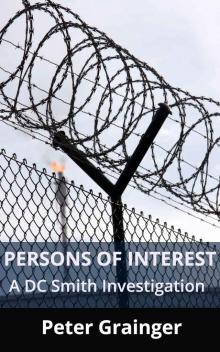 Persons of Interest
Persons of Interest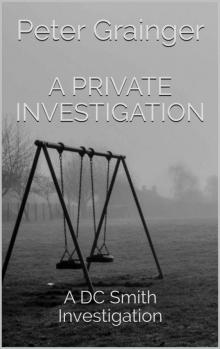 A Private Investigation
A Private Investigation Songbird
Songbird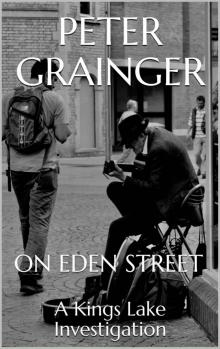 On Eden Street
On Eden Street An Accidental Death
An Accidental Death Time and Tide
Time and Tide An Accidental Death: A DC Smith Investigation
An Accidental Death: A DC Smith Investigation In This Bright Future
In This Bright Future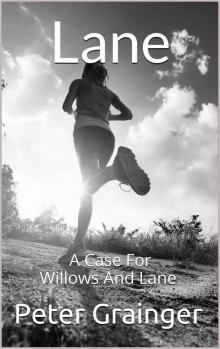 Lane: A Case For Willows And Lane
Lane: A Case For Willows And Lane The Rags of Time: A DC Smith Investigation
The Rags of Time: A DC Smith Investigation Luck and Judgement
Luck and Judgement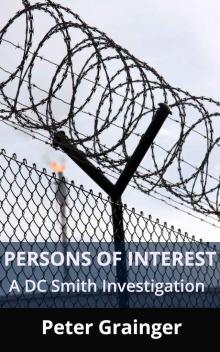 Persons of Interest: A DC Smith Investigation
Persons of Interest: A DC Smith Investigation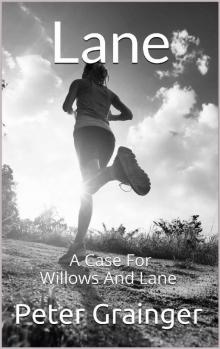 Lane
Lane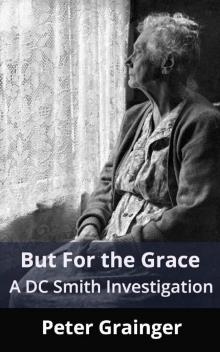 But For The Grace
But For The Grace Time and Tide: A DC Smith Investigation
Time and Tide: A DC Smith Investigation In This Bright Future: A DC Smith Investigation
In This Bright Future: A DC Smith Investigation The Rags of Time
The Rags of Time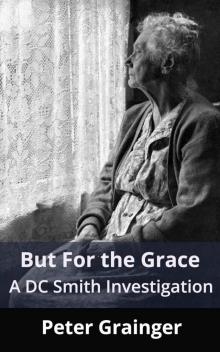 But For The Grace: A DC Smith Investigation
But For The Grace: A DC Smith Investigation Luck and Judgement: A DC Smith Investigation
Luck and Judgement: A DC Smith Investigation